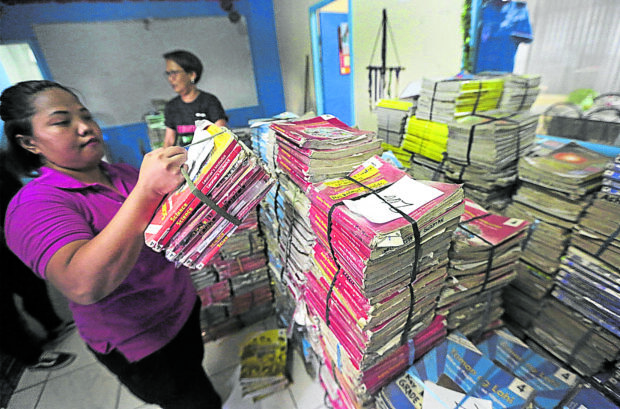Revisions delay procurement of school textbooks

Teachers arrange books set out for condemnation which will be replaced with newer editions at Pinyahan Elementary School in Quezon City on Wednesday, May 22, 2019, a few weeks before the start of classes. (Photo by GRIG C. MONTEGRANDE / Philippine Daily Inquirer)
MANILA, Philippines — Although it should take only six months, the procurement of public school textbooks takes from three to five years in practice because these need to undergo several revisions until they meet education standards.
“Manuscript revision takes the longest portion of the process — indicating that initially approved manuscripts are not really up to the standards set by the Department of Education (DepEd) such that [these go] through several layers of revisions to be acceptable,” said Kevin Ansel Dy, head of the Policy and Industry Research Division of the National Book Development Board (NBDB).
“The repeated and prolonged revision period also means more investment both for DepEd and bidding publishers in terms of time, human resources and finances,” Dy added at a meeting by the Second Congressional Commission on Education (Edcom II), a body tasked to conduct a thorough assessment and evaluation of the education sector’s performance.
On the other hand, the NBDB helps DepEd implement rules and regulations to ensure the quality of books produced by the publishing industry.
Failure in bidding
Ariz Cawilan, the DepEd’s Bureau of Learning Resources director, said one of the challenges in the textbook development process was the failure in bidding because of limited qualified suppliers.
Another was the low participation among prospective bidders—with some failing to meet technical requirements for procurement — and late deliveries due to “uncontrollable market forces” that affect the availability of supplies.
Dy agreed, saying: “The reason why we don’t have good quality materials is because our policy does not encourage participation, it does not encourage competition. That is why we have low-quality materials.”
Under the implementing rules and regulations for Republic Act No. 8047, the printing and evaluation of textbooks for public elementary and secondary schools is decentralized, which means it follows a “multiple textbook policy.”
In particular, the law states that the “NBDB shall ensure that the policy of multiple adoption of textbooks and other instructional materials be implemented to encourage the free flow of information and the deregulation of book publishing.”
Dy also attributed the prolonged revision period to conflicting comments among evaluators and the inability of the Bureau of Curriculum and Development, which is under DepEd, to give its full attention to evaluating textbooks.
Preselection pushed
Sen. Sherwin Gatchalian, Edcom II co-chair, suggested a shift to preselection — or choosing from a set of already published books—to fast-track the procurement process.
“Let’s not reinvent the wheel. Private schools have been doing preselection of books for years and if it has been working for them, why can’t public schools do the same? Instead of developing the manuscript, why don’t we just evaluate existing books?” Gatchalian said.
Jaymer Bareng, procurement management officer of the Government Procurement Policy Board, said they were open to studying the Manual of Procedures for the Procurement of Manuscripts for Textbooks and Teacher’s Manuals, which serves as the DepEd’s guide in the procurement process.
“We encourage DepEd to submit data regarding problems related to procurement,” he said, as he also stressed the need to “lessen collusion [and] favoritism… so that we can encourage other smaller publishers [to participate] in the bidding process.”